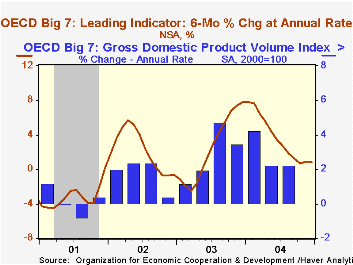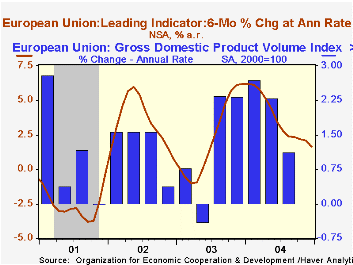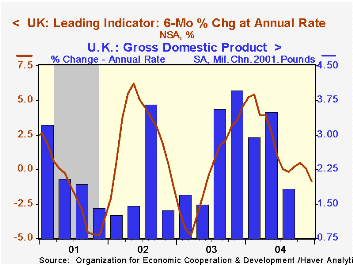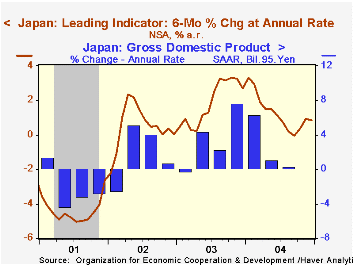 Global| Feb 14 2005
Global| Feb 14 2005OECD Leading Economic Index Up A Bit
by:Tom Moeller
|in:Economy in Brief
Summary
The Leading Index of the Big 7 OECD economies nudged 0.1% higher in December after a revised 0.3% gain in November. The gains were the first after eight months of sideways movement. Perhaps more important, however, was that the six [...]

The Leading Index of the Big 7 OECD economies nudged 0.1% higher in December after a revised 0.3% gain in November. The gains were the first after eight months of sideways movement. Perhaps more important, however, was that the six month growth rate in the index held at 0.8%. Though hardly indicative of a robust outlook, growth has been stable for three months at this upwardly revised level.
During the last ten years there has been a 69% correlation between the q/q change in the GDP Volume Index for the Big Seven countries in the OECD and the change in the leading index.
The leaders for the 15 countries in the European Union hesitated, with the six month growth rate falling to 1.6%, it's weakest since mid-2003. The French leaders' growth rate fell to 2.1% from the high of 8.4% early in 2004 and growth in the leaders for Germany held at 2.2%, down from 8.7% a year ago. The leaders' growth in Italy was negative for the eighth consecutive month but the Spanish leading index improved handily to a 3.1% rate of growth versus zero in July.
The leaders for the Japanese economy continued moderate improvement to a 0.8% growth rate versus negative growth in September but the leaders for the UK economy went negative.
Growth in the leading index for the US economy gained 0.4% in December for the second month following three months of decline. Six month growth improved to 0.9% from a low of 0.1% in October due to higher share prices, improved consumer sentiment and higher durable goods orders.
Visit the OECD.
OECD Growth from the Federal Reserve Bank of St. Louis can be found here. 

| OECD | Dec | Nov | Y/Y | 2004 | 2003 | 2002 |
|---|---|---|---|---|---|---|
| Composite Leading Index | 102.35 | 102.24 | 1.2% | 102.01 | 97.52 | 96.35 |
| 6 Month Growth Rate | 0.8% | 0.9% | 3.6% | 2.5% | 2.3% |
Tom Moeller
AuthorMore in Author Profile »Prior to joining Haver Analytics in 2000, Mr. Moeller worked as the Economist at Chancellor Capital Management from 1985 to 1999. There, he developed comprehensive economic forecasts and interpreted economic data for equity and fixed income portfolio managers. Also at Chancellor, Mr. Moeller worked as an equity analyst and was responsible for researching and rating companies in the economically sensitive automobile and housing industries for investment in Chancellor’s equity portfolio. Prior to joining Chancellor, Mr. Moeller was an Economist at Citibank from 1979 to 1984. He also analyzed pricing behavior in the metals industry for the Council on Wage and Price Stability in Washington, D.C. In 1999, Mr. Moeller received the award for most accurate forecast from the Forecasters' Club of New York. From 1990 to 1992 he was President of the New York Association for Business Economists. Mr. Moeller earned an M.B.A. in Finance from Fordham University, where he graduated in 1987. He holds a Bachelor of Arts in Economics from George Washington University.
More Economy in Brief
 Global| Feb 05 2026
Global| Feb 05 2026Charts of the Week: Balanced Policy, Resilient Data and AI Narratives
by:Andrew Cates






